DEVELOPING the
MICHIGAN NETWORK
FOR INCLUSIVE SCHOOLING
Michael Peterson
March 2, 2001
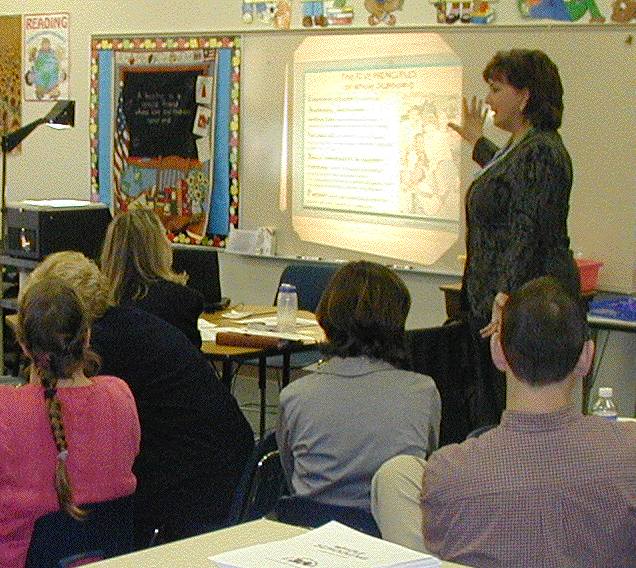 For the last three
years, university faculty associated with the Whole Schooling
Consortium have been working in several schools around Michigan
as researchers and critical friends for supporting positive change.
Each of these schools has made a commitment to including children
with disabilities in general education classes and moving away
from segregation and exclusion. These schools are also, simultaneously,
struggling to honor diversity, operate democratically, partner
with parents and the community, build a sense of care and community
in the school. We've been learning a lot. Out of conversations
we have become aware of the interest and need for teachers and
principals and parents to network with other schools to learn
from one another. Several of these schools also want to provide
leadership for inclusive teaching and schooling practices in the
state.
For the last three
years, university faculty associated with the Whole Schooling
Consortium have been working in several schools around Michigan
as researchers and critical friends for supporting positive change.
Each of these schools has made a commitment to including children
with disabilities in general education classes and moving away
from segregation and exclusion. These schools are also, simultaneously,
struggling to honor diversity, operate democratically, partner
with parents and the community, build a sense of care and community
in the school. We've been learning a lot. Out of conversations
we have become aware of the interest and need for teachers and
principals and parents to network with other schools to learn
from one another. Several of these schools also want to provide
leadership for inclusive teaching and schooling practices in the
state.
Two key principals, Jan Colliton from Hillside Elementary in
Farmington and Barbara Mick from Ausable Primary in Grayling,
collaborated with university faculty to plan a meeting held on
February 28, 2001 for and staff from 7 schools form the "MICHIGAN
NETWORK FOR INCLUSIVE SCHOOLING". We thought this would be
a good and valuable meeting. However, we weren't prepared for
the unleashing of energy and creativity and commitment and sharing
of stories that made many of us cry.
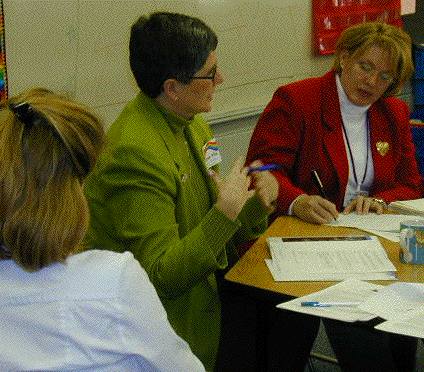 Some 40 people attended,
representing 7 schools and 4 school districts. Dr. Michael Peterson,
Facilitator of the Whole Schooling Consortium, began with an overview
of the Five Principles of Whole Schooling emphasizing the practical
ways these principles play out in schools. (See the website of
the Whole
Schooling Consortium). School staff the shared where they
were. The intellectual and emotional impact of the experiences
of people sharing about their growing journey towards inclusive
schooling was like a wave of hope, joy, and courage all rolled
into one -- struggles with bureaucracy, personal learning and
growth, collaboration of teachersm stories of specific children.
By lunch several people were choked up and almost crying. The
sense of commitment and care and courage in the room was awesome.
For those advocates and parents who struggle with cruel schools
and teachers, it would be amazing to know that such people exist
and are driving their schools and teaching, bit by bit, to including
all children in learning together. As one teacher said, "This
morning gives me hope."
Some 40 people attended,
representing 7 schools and 4 school districts. Dr. Michael Peterson,
Facilitator of the Whole Schooling Consortium, began with an overview
of the Five Principles of Whole Schooling emphasizing the practical
ways these principles play out in schools. (See the website of
the Whole
Schooling Consortium). School staff the shared where they
were. The intellectual and emotional impact of the experiences
of people sharing about their growing journey towards inclusive
schooling was like a wave of hope, joy, and courage all rolled
into one -- struggles with bureaucracy, personal learning and
growth, collaboration of teachersm stories of specific children.
By lunch several people were choked up and almost crying. The
sense of commitment and care and courage in the room was awesome.
For those advocates and parents who struggle with cruel schools
and teachers, it would be amazing to know that such people exist
and are driving their schools and teaching, bit by bit, to including
all children in learning together. As one teacher said, "This
morning gives me hope."
The afternoon we divided into heterogeneous groups made up
of representatives of the different schools and each group discussed
what a statewide network would do, would look like. We came back
together and shared, developed next steps, established a steering
committee to synthesize the ideas and another day meeting date
in late May. One group of teachers set a date to meet at a local
restaurant to continue sharing.
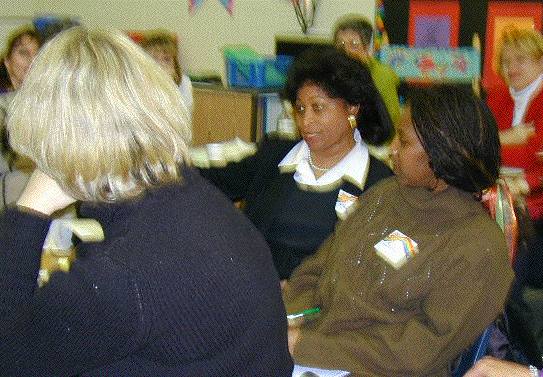 This meeting represents
many important activities building on now years of work and relationship
building within schools, between university faculty and teachers.
For the first time in Michigan schools are providing leadership
for inclusive schooling rather than advocacy groups desperately
wishing that schools would respond. The network links schools
in Detroit, two suburbs, and a very rural schools district, illustrating
the power and potential of work across the dividing lines of race
and socio-economic status. Teachers have begun to reach out across
schools to one another. All there were astounded by the power
of action and commitment for children collectively represented.
This meeting represents
many important activities building on now years of work and relationship
building within schools, between university faculty and teachers.
For the first time in Michigan schools are providing leadership
for inclusive schooling rather than advocacy groups desperately
wishing that schools would respond. The network links schools
in Detroit, two suburbs, and a very rural schools district, illustrating
the power and potential of work across the dividing lines of race
and socio-economic status. Teachers have begun to reach out across
schools to one another. All there were astounded by the power
of action and commitment for children collectively represented.
We expect this network to grow and develop. But for now, the
coming together of real leaders willing to risk, be creative,
and step out of their boxes on behalf of children was simply a
strong gust of fresh air.
Some Stories About Children That Made Us Cry
It's hard to recreate, because the most important part of
any story was being in a room of 40 committed people who's pride
was to share how they've been changing, learning, their schools
have shifted, they've built culture of care and inclusion.
One child with autism was discussed several times. I'll call
him Nat. He's in the first grade. Rose, a school psychologist,
talked about her work with kids with autism and how she believed
she was such an expert before, knew that kids needed to be in
separate classes. Then she talked about Nat. The other day Nat
had a problem in his class. He was OK but came out to talk with
Rose and the speech therapist who were using 'social stories'
to help him explore feelings and relationships. "How did
you feel?" she asked. After a bit, Nat said, "I felt
embarrassed." This surprised Rose to no end. "Why did
you feel embarrassed?" she said. "Because I was yelling
and screaming and no one else was", Nat said. Rose went on
to say that in her previous segregated classes EVERYONE was yelling
and screaming and NO ONE was embarrassed. Later in the session,
a teacher from the early childhood center suddenly realized what
specific child they were discussing. (Another story I don't remember
was told.) She was amazed at his progress and started to choke
up. "This is what real networking means!!" she said.
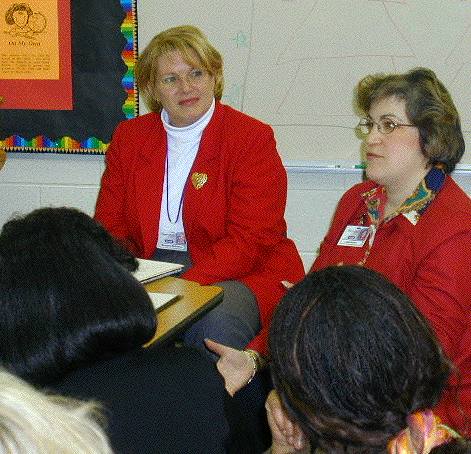 There were some more.
About 'Wesley', a kindergartner, with lots of problems at home
who was accidentally delivered to his house one day with no one
home and burnt it down. I had personally visited the school the
day after this happened and Wesley was wild, his eyes filled with
a sense of unreality and terror. Yet, I was amazed, in this school,
as I was there that day and have been other days. Literally every
adult I met and talked to seemed to have an unwavering commitment
that this wild child should stay in their school. Every adult,
from aides to the speech therapist to numerous teachers. They
just talked about this kid with concern and hope. At the time
they had an aide assigned full-time who was doing simple work
with him, just keeping him in school. I sat in the office of the
principal who cried in fear that he would be transferred to another
county where he surely would be placed in a segregated program
for kids with emotional disturbance. This was all in November.
Wesley is still at that school, still with support by an aide,
but now in the kindergarten class full-time. The terror in his
eyes has subsided and you can see the "great little boy he
is coming out" to quote one of the teachers. In many schools
I see teachers and principals filled with rage against such children.
This school has built a culture of care and inclusion.
There were some more.
About 'Wesley', a kindergartner, with lots of problems at home
who was accidentally delivered to his house one day with no one
home and burnt it down. I had personally visited the school the
day after this happened and Wesley was wild, his eyes filled with
a sense of unreality and terror. Yet, I was amazed, in this school,
as I was there that day and have been other days. Literally every
adult I met and talked to seemed to have an unwavering commitment
that this wild child should stay in their school. Every adult,
from aides to the speech therapist to numerous teachers. They
just talked about this kid with concern and hope. At the time
they had an aide assigned full-time who was doing simple work
with him, just keeping him in school. I sat in the office of the
principal who cried in fear that he would be transferred to another
county where he surely would be placed in a segregated program
for kids with emotional disturbance. This was all in November.
Wesley is still at that school, still with support by an aide,
but now in the kindergarten class full-time. The terror in his
eyes has subsided and you can see the "great little boy he
is coming out" to quote one of the teachers. In many schools
I see teachers and principals filled with rage against such children.
This school has built a culture of care and inclusion.
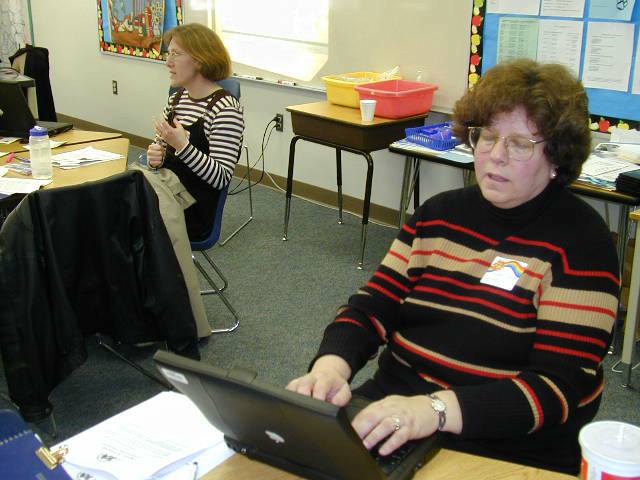 It was,
however, not so much the stories themselves that made people
It was,
however, not so much the stories themselves that made people
"teary" and gave so much emotional impact to the day.
What was so very powerful was that it was a group of educators
sharing the stories -- people at all levels from district administrators
to paraprofessionals, and from poor urban to wealthy suburban
districts with some in between, all sorts of experiences as educators
and as parents themselves. I think it was an emotionally moving
day because there was such a sense that at last we were all having
the "right" conversation, and with the "right"
people (except that the parents were missing, except for a few
who wear a professional hat, too). The commitment to the shared
value of inclusion was so strong, and such a new experience to
everyone present.
--Lynne (MI)
ltmrs@mediaone.net
 For the last three
years, university faculty associated with the Whole Schooling
Consortium have been working in several schools around Michigan
as researchers and critical friends for supporting positive change.
Each of these schools has made a commitment to including children
with disabilities in general education classes and moving away
from segregation and exclusion. These schools are also, simultaneously,
struggling to honor diversity, operate democratically, partner
with parents and the community, build a sense of care and community
in the school. We've been learning a lot. Out of conversations
we have become aware of the interest and need for teachers and
principals and parents to network with other schools to learn
from one another. Several of these schools also want to provide
leadership for inclusive teaching and schooling practices in the
state.
For the last three
years, university faculty associated with the Whole Schooling
Consortium have been working in several schools around Michigan
as researchers and critical friends for supporting positive change.
Each of these schools has made a commitment to including children
with disabilities in general education classes and moving away
from segregation and exclusion. These schools are also, simultaneously,
struggling to honor diversity, operate democratically, partner
with parents and the community, build a sense of care and community
in the school. We've been learning a lot. Out of conversations
we have become aware of the interest and need for teachers and
principals and parents to network with other schools to learn
from one another. Several of these schools also want to provide
leadership for inclusive teaching and schooling practices in the
state. Some 40 people attended,
representing 7 schools and 4 school districts. Dr. Michael Peterson,
Facilitator of the Whole Schooling Consortium, began with an overview
of the Five Principles of Whole Schooling emphasizing the practical
ways these principles play out in schools. (See the website of
the
Some 40 people attended,
representing 7 schools and 4 school districts. Dr. Michael Peterson,
Facilitator of the Whole Schooling Consortium, began with an overview
of the Five Principles of Whole Schooling emphasizing the practical
ways these principles play out in schools. (See the website of
the  This meeting represents
many important activities building on now years of work and relationship
building within schools, between university faculty and teachers.
For the first time in Michigan schools are providing leadership
for inclusive schooling rather than advocacy groups desperately
wishing that schools would respond. The network links schools
in Detroit, two suburbs, and a very rural schools district, illustrating
the power and potential of work across the dividing lines of race
and socio-economic status. Teachers have begun to reach out across
schools to one another. All there were astounded by the power
of action and commitment for children collectively represented.
This meeting represents
many important activities building on now years of work and relationship
building within schools, between university faculty and teachers.
For the first time in Michigan schools are providing leadership
for inclusive schooling rather than advocacy groups desperately
wishing that schools would respond. The network links schools
in Detroit, two suburbs, and a very rural schools district, illustrating
the power and potential of work across the dividing lines of race
and socio-economic status. Teachers have begun to reach out across
schools to one another. All there were astounded by the power
of action and commitment for children collectively represented. There were some more.
About 'Wesley', a kindergartner, with lots of problems at home
who was accidentally delivered to his house one day with no one
home and burnt it down. I had personally visited the school the
day after this happened and Wesley was wild, his eyes filled with
a sense of unreality and terror. Yet, I was amazed, in this school,
as I was there that day and have been other days. Literally every
adult I met and talked to seemed to have an unwavering commitment
that this wild child should stay in their school. Every adult,
from aides to the speech therapist to numerous teachers. They
just talked about this kid with concern and hope. At the time
they had an aide assigned full-time who was doing simple work
with him, just keeping him in school. I sat in the office of the
principal who cried in fear that he would be transferred to another
county where he surely would be placed in a segregated program
for kids with emotional disturbance. This was all in November.
Wesley is still at that school, still with support by an aide,
but now in the kindergarten class full-time. The terror in his
eyes has subsided and you can see the "great little boy he
is coming out" to quote one of the teachers. In many schools
I see teachers and principals filled with rage against such children.
This school has built a culture of care and inclusion.
There were some more.
About 'Wesley', a kindergartner, with lots of problems at home
who was accidentally delivered to his house one day with no one
home and burnt it down. I had personally visited the school the
day after this happened and Wesley was wild, his eyes filled with
a sense of unreality and terror. Yet, I was amazed, in this school,
as I was there that day and have been other days. Literally every
adult I met and talked to seemed to have an unwavering commitment
that this wild child should stay in their school. Every adult,
from aides to the speech therapist to numerous teachers. They
just talked about this kid with concern and hope. At the time
they had an aide assigned full-time who was doing simple work
with him, just keeping him in school. I sat in the office of the
principal who cried in fear that he would be transferred to another
county where he surely would be placed in a segregated program
for kids with emotional disturbance. This was all in November.
Wesley is still at that school, still with support by an aide,
but now in the kindergarten class full-time. The terror in his
eyes has subsided and you can see the "great little boy he
is coming out" to quote one of the teachers. In many schools
I see teachers and principals filled with rage against such children.
This school has built a culture of care and inclusion. It was,
however, not so much the stories themselves that made people
It was,
however, not so much the stories themselves that made people